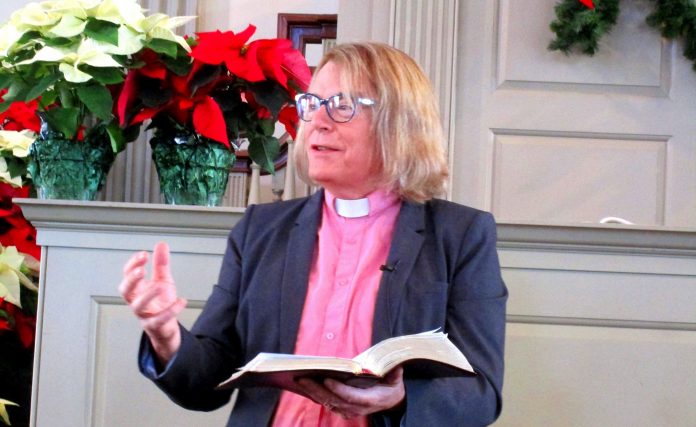[This story appears in the current January/February 2019 issue of Boston Spirit magazine. Subscribe for free today.]
Transitioning is never a breezy process. Beyond any medical or therapeutic interventions, there are the complications of coming out to family, friends, colleagues and acquaintances, and of living in the world. There may even be a spouse, as there was in Rev. Donnie Anderson’s case. But few are in the position of transitioning while holding a very public position.
As the executive minister of the Rhode Island State Council of Churches (RICC), Anderson was as public as they come, a fixture in Rhode Island faith communities and known for her social activism.
Growing up in a strict Methodist home, Donnie Anderson knew she was different, but she didn’t have a word for it. “All the boys who tended toward the feminine, like I did, were labeled as gay,” she says, “but I was not attracted to boys or men. I knew I was not gay.”
Still, she was fascinated with all things female; she remembers at a young age, being drawn to the powder puff in her Aunt Dot’s bedroom. And at nine years old, she approached her mother, saying, “Isn’t it wonderful what God has done? He gave you Paul for Dad, and me for you and Aunt Dot!” Not surprisingly, her mother responded sternly, saying that there were two teams, and Donnie played for the other team.
“Neither of us knew what we were talking about,” Anderson recalls, smiling.
As she grew up, Anderson experienced periods of dysphoria, and got very good at compartmentalizing as a defense against the dissonance, anxiety and discomfort. Living as a man, she was ordained as a Baptist minister. She married a woman and fathered two children, all while burying the knowledge that something was not right. Feelings would bubble up occasionally, but she always pushed them back down.
In 2007, Anderson became the executive minister of the RICC, serving as a voice of witness to the tenets of the faith she so loves. Her work represented a commitment to gathering denominations, congregations, faith leaders, and individuals together for dialogue, and to work toward a shared vision of peace and social justice. It was a culmination of a long, rewarding career, and she clearly fit the bill. But there was still something not right, and there was no reconciling it.
Her dysphoria came to a point of change when, standing in front of the mirror one day, she forced herself to say out loud what she had known in her heart for a while. “Admit it,” she said to her reflection, “you’re a woman.”
Taking control
That was some four years ago. At first, she intended to take that knowledge to the grave, but the stress of it began to wreak havoc on her, and she knew she needed to find someone to tell. In her mind, she went through some possible confidants, but realized fairly quickly that she could tell no one before she told her wife. “It was my first step to transitioning,” she recalls. “I had a plan. I even found Deb a therapist. But I was so afraid I’d chicken out.” She did tell Deb, who was understandably shocked, but who came around after much discussion (and who is by her side to this day).
Within days, Anderson made an appointment with Dr. Michelle Forcier, who specializes in treating transgender individuals. She agreed to manage Anderson’s transition. “I’ll never forget,” says Anderson, “Dr. Forcier told me one day that I was the one in control. I started taking hormones that day.”
There was more coming out, to her daughters, a small group of friends and eventually the governing board of the RICC. She penned a letter to them, speaking her truth and asking for a sabbatical during which to begin her transition. To her immense joy and relief, they approved her request and gave her a unanimous vote of confidence. “I was so grateful! It meant the world to be validated in my work, in my ministry. If you cut me, I bleed pastor.”
The state of Rhode Island seems to have gotten behind her quickly as well. “I have always loved Rhode Island,” she says, “but the depth of support I have received here is amazing.” During her sabbatical, she spent time with family and friends, learning and growing more comfortable with the transition. More than anything, she recalls the outpouring of support, with other faith leaders sending her gift cards to Nordstrom and J.Jill.
Rev. Anderson is back now, and focused on many things, not the least of which is transgender rights. She is particularly grateful to those who came before her, the pioneers who risked everything to transition. Aware that she would not have been able to accomplish this transition even 20 years ago, she is determined to pay forward that debt. Among other things, she is working with the Girl Scouts organization, helping them to address issues around trans scouts.
“I’m helping them to move beyond the binary,” she explains, “as they go forward into this new space with courage, both for the trans youth but also the cis scouts. Exposure to others, to difference, is so enriching.”
Beyond the binary
She also tells her story whenever she can. “I went to a Rhode Island trans wellness conference a while back,” she says. “Attending as an ally, I heard a trans woman tell her story and it helped me in my decision to transition. So I follow her example and tell my story.”
Her privilege is always on her mind too. “I’ve had so much support,” she says, “and I am aware that others have paid dearly for being true to themselves. I feel called to do more because of my privilege.”
There is much to do, what with the transphobic resistance—much of it backed by religious groups—becoming more galvanized in recent years. Anderson is painfully aware of the tragic suicide statistics, particularly among trans youth, and sees the anger in the faces of the opposition. “The wrath of man,” she says, quoting the New Testament, “does not achieve the righteousness of God. It breaks my heart to see what is being done to appease a group of people at the expense of innocent people.”
Are there places she’d think twice about going? “I’m not trying to pass,” she affirms. “I’m just being me. When you’ve been socialized as a man for 70 years, it’s hard to change that overnight. And so, when I am out shopping, for example, with my clerical collar on, I get a lot of looks. There are those who think I am the ultimate perversion. But I know I am fearfully and wonderfully made. I am not a mistake, and I have never questioned God’s love for me.”









